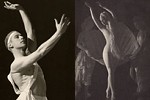| SHADOWS ON THE WALL | REVIEWS | NEWS | FESTIVAL | AWARDS | Q&A | ABOUT | TALKBACK | |
 Arthouse films ’06 Arthouse films ’06 | |
| Films unlikely to be showing at your local multiplex... | |
|
On this page:
BALLETS RUSSES |
BOY CULTURE |
ENOUGH MAN |
FAVELA RISING
< < M O R E | M O R E > > last update 5.Feb.06 See also: SHADOWS FILM FESTIVAL | SHORT FILMS | |
 R E V I E W B Y R I C H C L I N E
R E V I E W B Y R I C H C L I N E | |
Ballets Russes

| |
 Spanning nearly a century of dance, this well-assembled doc not only traces the remarkable development of an artform, but it gives the artists a chance to tell their stories.
Spanning nearly a century of dance, this well-assembled doc not only traces the remarkable development of an artform, but it gives the artists a chance to tell their stories.
The Ballet Russe first premiered in 1909 Paris, and continued in various forms until 1962. Over the years there were splits and rivalries, as choreographers (such as Ballanchine and Massine) and dancers stormed off to form their own companies. They travelled the world, introducing European dance to the United States, Australia and South America. During World War II they fled to America, where most dancers stayed. Then some 40 years after they finally disbanded, the dancers reunited in 2000 to reminisce for the cameras. The filmmakers assemble these and other interviews alongside a rich trove of archive footage--grainy home movies, film clips anything they could find that captured these groundbreaking performers along the way. It's such a comprehensive approach that it's almost exhausting; they seem to leave no path untravelled to get the entire story on film once and for all. The result is remarkably engaging, full of wit and humour. These feisty 80-something artists still have the spark we see in them on stage as teenagers. In addition to a detailed look at the development of modern ballet, the film also catches telling elements of 20th century history through art (Picasso, Dali and Matisse worked on various productions), global politics and culture in Paris, London, New York and places much more far flung. The reaction of uninitiated audiences is fascinating, as is the Hollywood interlude, when one company starred in a series of big musical movies. It's beautifully edited into a narrative form that follows the story chronologically through personal perspectives. This keeps things in historical context and makes the ongoing "ballet wars" much more involving. It also deepens several anecdotes, such as the encounters with increasing racism in the South. Overall, the vast amount of information is a bit overwhelming, and probably would have been better served by a shorter film and/or a longer TV series. But this is still wonderfully entertaining. |
dir Daniel Geller, Dayna Goldfine scr Daniel Geller, Dayna Goldfine, Gary Weimberg, Celeste Schaefer Snyder narr Marian Seldes with Alicia Markova, Frederic Franklin, Irina Baronova, Tania Riabouchinska, Mia Slavenska, Nathalie Krassovska, George Zoritch, Tatiana Stepanova, Tamara Tchinarova Finch, Maria Tallchief, Yvonne Chouteau, Marc Platt, Raven Wilkinson, Nini Theilade, Miguel Terekhov, Yvonne Craig  release US 26.Oct.05,
release US 26.Oct.05,UK 21.Apr.06 05/US 1h58 |
|
PG some themes 30.Jan.06 | |
 R E V I E W B Y R I C H C L I N E
R E V I E W B Y R I C H C L I N E | |
Boy Culture

| |
 There are some intriguing issues gurgling inside this rather talky romantic drama. It sentimentalises and moralises at times, but the characters remain nicely complicated right to the end.
There are some intriguing issues gurgling inside this rather talky romantic drama. It sentimentalises and moralises at times, but the characters remain nicely complicated right to the end.
X (Magyar) is a 29-year-old hustler, sharing his Seattle apartment with friends Andrew (Stephens), upon whom X has a crush, and Joey (Trent), who has a thing for X. This unrequited tension keeps them friendly, and nothing more. Even with his job, X feels he has never had a relationship--he's never had sex when he wasn't paid for it. But he's just too stubborn to admit to Andrew how he really feels. Then Andrew invites him along to his ex's wedding in Portland. Perhaps a road trip will get things moving. The plot, based on a book by Matthew Rettenmund, has some sharp wrinkles in it as the characters circle around each other in increasingly complicated ways. Although the film's simplistic romantic-comedy structure undermines the subtlety a bit. We know exactly where it's going, and it's a somewhat tortured journey to the predictable ending (which still elicits a warm sigh). There's also a strangely judgmental tone running through the entire film, holding everyone to some sort of "higher" moral standard, which feels completely at odds with a film set in this kind of lifestyle. But there's a lot going on between the characters, and the actors are exceptionally good at building on the interaction and drawing out meaning in unexpected places. Magyar is especially interesting on screen, and his odd relationship with one of his clients (Bauchau) is a central theme in the film, which becomes a little obvious and sentimental at the end, but does make an important point. Stephens is elusive and sexy, while Trent is rather too air-headed for words, but both are very likeable. There are some profound comments in here about how fearful we are of change, and how that prevents us from really making any commitment. The film kind of blurts this message out and then carries on into the next corny/sappy scene, but the truth is in there, and as a result the story has a surprisingly warm bite at the end.
See also: BOY CULTURE: THE SERIES (2021)
|
dir Q Allan Brocka scr Philip Pierce, Q Allan Brocka with Derek Magyar, Darryl Stephens, Jonathon Trent, Patrick Bauchau, George Jonson, Emily Brooke Hands, Joshua Boswell, George Rickle, Ann Van Alt, Joel Rene, Mistropan Namenko  release UK Mar.06 llgff, US 23.Mar.07 06/US 1h29  Also: TRIBECA FEST |
|
15 themes, language, sexuality 13.Feb.06 llgff | |
 R E V I E W B Y R I C H C L I N E
R E V I E W B Y R I C H C L I N E | |
Enough Man 
| |
 This is the purest form of documentary, merely letting a group of people tell their own story without the intrusion of experts or outsiders to offer interpretations or judgments. And besides being strikingly daring and eye-opening, it's also, naturally, insightful.
This is the purest form of documentary, merely letting a group of people tell their own story without the intrusion of experts or outsiders to offer interpretations or judgments. And besides being strikingly daring and eye-opening, it's also, naturally, insightful.
The interviewees are nine female-to-male transsexuals who are all at various stages in the process and living various lifestyles. They couldn't really be much different if they tried: Casey is a slutty cowboy, Wendell and Randall are giggly teens, Ted is a nice-guy all-American type, Joshua and Raven live in a dominant-submissive commune, Dale runs a Chicago porn shop, Tommy lives as a dog, and Rik is a redneck-like Native American. You also couldn't find a much more varied expression of sexuality. Are these people men or women, gay or straight? Do they really care? Some of them do, and some of them live distinctly straight lives with girlfriends and drinking buddies. Others revel in their uniqueness and search for extreme ways of self-expression. Most of them have been completely rejected by their families and are now building new families among people of what they call "the third gender". Director Woodward takes a bracingly straightforward approach, fearlessly letting his subjects talk about absolute anything. They even graphically demonstrate how sex works for them. In some cases fetishes and roleplay provide them with a sense of belonging and security, mainly because these subcultures are more welcoming of people who refuse to fit into boxes. All of them speak honestly about how they are trying to be who they truly feel they are, despite the discrimination around them, including the fact that most of them will never qualify for any sort of medical insurance. They talk openly about a lot of astonishingly private issues, and as a result the film is truly informative in a way a more scientific doc could never be. It also concludes with a vividly strong statement that gender isn't just a theory: it's real people. |
dir Luke Woodward with Casey, Natalie, Wendell, Randall, Ted, Dale, Tommy, Joshua, Raven, Rik, Jessica  release US 22.Jun.05 Frameline, UK Mar.06 llgff 05/US 1h01 
|
|
18 themes, language, nudity, sexuality 13.Feb.06 llgff | |
 R E V I E W B Y R I C H C L I N E
R E V I E W B Y R I C H C L I N E | |
Favela Rising
 | |
 There's a raw, edgy power to this documentary, which takes a distinctly positive approach to a difficult situation. It's about young people in one of Rio's worst slums who are changing their world for the better.
There's a raw, edgy power to this documentary, which takes a distinctly positive approach to a difficult situation. It's about young people in one of Rio's worst slums who are changing their world for the better.
At the centre is Anderson Sa, who after a tragic experience as a teen asked himself what he could do to end the violence in his Vig·rio Geral favela, where children join drug gangs and rarely live to age 30. His instrument of change is music, and he formed the group AfroReggae to harness and focus hope and community pride. These are young people who don't want to run away from the situation; they face it head-on with the goal of making things better. It's a remarkable story, made even more amazing by the things filmmakers Zimbalist and Mochary witness along the way, from personal reactions to various events to catching some shocking things on film. Over the course of production, they often gave cameras to the kids, and the footage vividly reveals the culture of guns and murder in a place that often resembles a war zone, even though Copacabana Beach is just over the hill. The filmmakers edit the material with style and emotion--combining some slick, colour-drenched footage with much rougher home-video quality images and intimate interviews. Along the way they trace the history of Vig·rio Geral, the revenge killings and horrific massacres, the thuggish, heavy-handed police presence. This film is intriguingly similar to David LaChapelle's Rize, about youth turning their physicality to something positive--sweaty, artistic and bursting with energy. AfroReggae's performances are extremely tough, but also emotive, vigorous and rhythmic--a fusion of rap, reggae and soul, along with dance, theatre and capoeira. It's not very easy to identify with these people and their situations; the filmmakers keep the story specific, and rarely touch on universal issues. But this is a compelling look at one of the world's most difficult places, insightfully profiling a born leader who's brave and unflinching in his insistence that his own people must give respect to each other, to show the world that they can create music and art, not just death. |
dir Jeff Zimbalist, Matt Mochary with Anderson Sa, Jose Junior, Marcio Nunes, Andre Luis Azevedo Zuenir Ventura, Altair Martins, Michele Moraes, Lizietia Carmen Siqueira  release US 2.Jun.06,
release US 2.Jun.06,UK 10.Mar.06 05/US ThinkFilm 1h20 |
|
15 themes, language, violence 2.Feb.06 | |


See also: SHADOWS FILM FESTIVAL | SHORT FILMS © 2006 by Rich Cline, Shadows
on the Wall
| |